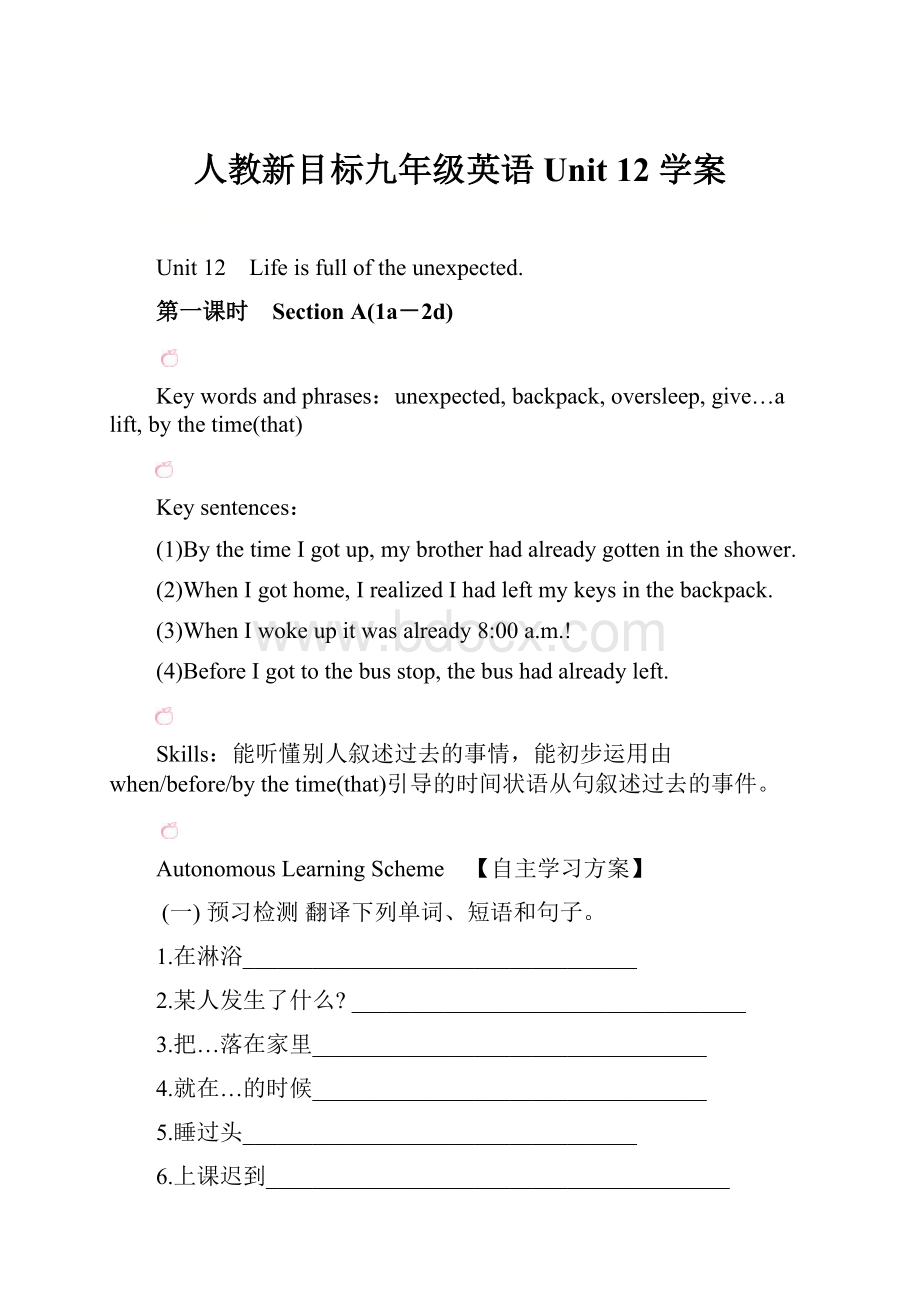人教新目标九年级英语Unit 12 学案.docx
《人教新目标九年级英语Unit 12 学案.docx》由会员分享,可在线阅读,更多相关《人教新目标九年级英语Unit 12 学案.docx(13页珍藏版)》请在冰豆网上搜索。

人教新目标九年级英语Unit12学案
Unit12 Lifeisfulloftheunexpected.
第一课时 SectionA(1a-2d)
Keywordsandphrases:
unexpected,backpack,oversleep,give…alift,bythetime(that)
Keysentences:
(1)BythetimeIgotup,mybrotherhadalreadygottenintheshower.
(2)WhenIgothome,IrealizedIhadleftmykeysinthebackpack.
(3)WhenIwokeupitwasalready8:
00a.m.!
(4)BeforeIgottothebusstop,thebushadalreadyleft.
Skills:
能听懂别人叙述过去的事情,能初步运用由when/before/bythetime(that)引导的时间状语从句叙述过去的事件。
AutonomousLearningScheme 【自主学习方案】
(一)预习检测翻译下列单词、短语和句子。
1.在淋浴__________________________________
2.某人发生了什么?
__________________________________
3.把…落在家里__________________________________
4.就在…的时候__________________________________
5.睡过头__________________________________
6.上课迟到________________________________________
7.停止运转,不工作了_________________________________
8.捎(某人)一程__________________________________
ClassroomLearningGuidanceScheme 【课堂导学案】
【知识点拨】
1.BythetimeIgotoutside,thebushadalreadyleft.当我出来时,公共汽车已经离开了。
“bythetime”表示“当/到……时”,引导时间状语从句。
如果从句中用了一般过去时,主句中常用过去完成时;如果主句中用了将来时,从句中常用一般现在时表将来。
如:
BythetimeIgotup,hehadalreadyleft.当我起床时,他已经离开了。
Hewillbeateacherbythetimeheistwenty.到他二十岁时,他会成为一名教师。
【拓展】bynow表示“到现在为止”,通常与现在完成时连用。
如:
BynowIhavecollected200dolls.到现在为止,我已收集了二百个布娃娃。
【小试牛刀】根据汉语提示完成下面的句子,每空一词。
(1)当我到车站时,火车已经开走了。
______________________Igottothestation,thetrain______________________left.
(2)长大后,他会离开这儿。
He______________________herebythetimehe___________up.
2.Myalarmclockdidn'tgooff!
我的闹钟没响。
gooff意为“发出响声”。
如:
Somethingwaswrongwithmyalarmclockanditdidn'tgooff.我的闹钟出毛病了,它没有响!
【拓展】
(1)goby意为“(时间)过去;消逝”。
如:
Timegoesbysecondbysecond.时间一秒秒地消逝。
(2)goon继续。
如:
Pleasegoonworking.请继续工作。
【小试牛刀】单项选择。
—Whywereyoulatethismorning?
—Myalarmclockdidn't______,soIoverslept.
A.gobyB.goonC.gooffD.godown
3.Carl'sdadsawmeonthestreetandgavemealiftinhiscar.卡尔的爸爸在街上看到我,捎了我一程。
givesb.alift是动词短语,意为“捎某人一程”,相当于givesb.aride/givearidetosb.。
如:
I’malittlelate,canyougivemealift,dad?
我要迟到了,你能捎我一程吗,爸爸?
【小试牛刀】他让我搭便车去车站。
He__________________________________________tothestation.
【达标训练】单项选择。
()1.Tomdrovebyandgavemea_________onthewayhome.
A.flightB.runC.walkD.lift
()2.WhenIgottothecinema,themovie_________forfiveminutes.
A.beganB.hadbegunC.hadbeenonD.hasbeenon
()3.Shewillbeanurse_________shegraduatesfromtheschool.
A.bythetimeB.atthistimeC.atthattimeD.atatime
()4.Thealarmis_________.Theremustbesomethingwrongwiththecar.
A.goingonB.goingbyC.goingoffD.goingdown
()5.I_________thismorningandmissedtheearlybus.
A.oversleptB.sleptC.heldD.caught
Ⅱ.根据汉语提示完成下面的句子,每空一词。
1.他醒来发觉自己在医院里。
He________________________andfoundhimselfinhospital.
2.看!
那些孩子正向学校飞奔。
Look!
Thechildrenare________________________toschool.
3.他穿上大衣走了出去。
He________________________hiscoatandwentout.
4.你每天应该至少刷两次牙。
Youshouldbrushteeth________________________twiceaday.
5.他踩了我的脚,甚至连一声“对不起”都没有说。
He____________________________________“sorry”whenhesteppedonmytoes.
归纳总结:
“unexpected,backpack,oversleep,give…alift,bythetime(that)”和重点句型
1.BythetimeIgotup,mybrotherhadalreadygottenintheshower.
2.WhenIgothome,IrealizedIhadleftmykeysinthebackpack.
3.WhenIwokeupitwasalready8:
00a.m.!
4.BeforeIgottothebusstop,thebushadalreadyleft.”
第二课时 SectionA(3a-4c)
Keywordsandphrases:
block,worker,above,burn,alive,airport,till,west,cream,workday,pie,showup,bean,market,bytheendof
Keysentences:
(1)WhenIgottoschool,IrealizedthatIhadleftmybackpackathome.
(2)BythetimeIgotbacktoschool,thebellhadrung.
(3)BeforeIgottothebusstop,thebushadalreadyleft.
(4)IwasabouttogouptomyofficewhenIdecidedtogetacoffeefirst.
(5)AsIwaswaitinginlinewiththeotherofficeworkers,Iheardaloudsound.
Skills:
运用由when/before/bythetime引导的时间状语从句叙述过去的事件。
AutonomousLearningScheme 【自主学习方案】
(一)预习检测翻译。
1.世贸中心___________________2.beaboutto_______________________
3.goup_______________________4.myfavoritecoffeeplace____________________
5.排队等候________________________6.怀疑地凝视着_______________________
7.thinktooneself______________________8.hearabout______________________
9.thedaybefore______________________10.endupdoingsth.______________________
11.showup_______________________12.Lifeisfulloftheunexpected.______________________
13.Mybadluckhadunexpectedlyturnedintoagoodthing.________________________________
【知识点拨】
1.Westaredindisbeliefattheblacksmokerisingabovetheburningbuilding.
我们难以置信地看着燃烧的建筑物升起的黑烟。
burn动词,有两个基本意思:
(1)燃烧,点燃,发光
如:
Sheburntacandle.她点燃了一根蜡烛。
Weburncoaltokeepwarm.我们烧煤取暖。
(2)烧伤,烧焦,烫伤,晒黑
如:
Thechildgotburntwhileplayingwithfire.那小孩玩火时,把自己烧伤了。
【拓展】
(1)burnaway烧掉
如:
Halfofthecandlehadburntaway.蜡烛已烧掉一半了。
(2)burndown渐渐烧完
如:
Theroomgrewcolderasthefireburntdown.随着炉火逐渐减弱,屋里越来越冷。
【小试牛刀】根据汉语提示完成下面的句子,每空一词。
(1)她的信已经烧了。
Herlettershave________________________________.
(2)他的手在炉子上烫伤了。
He________________________________________onahotstove.
2.Ifeltluckytobealive.我感到很幸运能活下来。
辨析:
alive,living,live与lively
alive“活着,活的,有生命的,还出气的”,可指人也可指物,可作表语、后置定语、宾补。
living“活着,尚在人间,健在的”,指人或物,作定语或表语。
live“活着的,活生生的”,指物,不指人,作定语。
lively“活泼的,活跃的,充满生气的”,可指人,也可指物,作定语、表语或宾补。
【小试牛刀】单项选择。
(1)JinYongisoneofthegreatestandoldest______writers.Heisstill______.
A.living;aliveB.living;liveC.alive;livingD.alive;lively
(2)—Ishisgrandmotherstill______?
—Yes,sheis102yearsold!
A.liveB.livingC.aliveD.lively
3.TheotherplaneswerefullsoIhadtowaittillthenextday.别的飞机也满员了,因此我不得不等到第二天。
till意为“到,直到”,相当于until
(1)用于肯定句时,主句的动词只用延续性的,它所表示的动作一直延续到till或until表示的时间为止,意为“直到…为止”。
如:
ShewatchedTVtillhermothercameback.她看电视直到她母亲回来。
(2)用于否定句时,主句的动词一般是非延续性的,也可以是延续性的,它所表示的动作直到till或until所表示的时间才发生,意为“直到…(才)”。
如:
Shedidn'twatchTVtillhermothercameback.直到她母亲回来她才(开始)看电视。
【小试牛刀】单项选择。
(1)Ididn'tbelievehecoulddrive______hetoldme.
A.onceB.whileC.sinceD.till
(2)—Mark,youlooksotired.—Oh,Iworked______itwas12o’clocklastnight.
A.unlessB.afterC.tillD.as
第三课时 SectionB(1a-1e)
Keywordsandphrases:
fool,costume,embarrassed,costumeparty
Keysentences:
(1)WhathappenedtoDaveonAprilFool'sDay?
(2)Afriendinvitedhimtoacostumeparty.
AutonomousLearningScheme 【自主学习方案】
(一)预习检测完成下列短语。
1.愚人节________________________________________
2.化装舞会________________________________________
3.赶到,露面________________________________________
4.邀请某人做某事________________________________________
5.getdressed________________________________________
6.不睡觉,熬夜________________________________________
【知识点拨】happen的“三种用法”与“三点注意”:
1.happen是不及物动词。
happen在初中英语教材中的用法主要有以下三种:
(1)“sth.+happen+地点/时间”,意为“某地/某时发生了某事”。
如:
Anaccidenthappenedinthatstreet.那条街发生了一起事故。
What'shappeningoutside?
外面发生什么事了?
(2)“sth.+happento+sb.”意为“某人出了某事(常指不好的事发生在某人身上)”。
如:
Acaraccidenthappenedtohimyesterday.昨天他发生了交通事故。
Whathappenedtoyou?
(=Whatwaswrong/thematterwithyou?
)你怎么啦?
(3)“sb.+happen+todosth.”意为“某人碰巧做某事”。
如:
Ihappenedtomeetherinthestreet.我碰巧在街上遇见她了。
IthappenedthatIwasoutwhenhecalled.他来访时我碰巧不在。
2.同学们在使用happen时,以下三点情况值得注意:
(1)happen为不及物动词,不能用于被动语态。
例如,要表示“这个故事发生在去年。
”不能说:
Thestorywashappenedlastyear.但可以说:
Thestoryhappenedlastyear.
(2)happen为短暂性动词,不能与表示一段时间的状语连用。
例如,要表示“这事发生一年了。
”不能说:
Thishappenedforoneyear.但可以说:
Thishappenedoneyearago.
(3)happen一般用来强调某事发生的偶然性。
如要表示事先安排或有准备的事情或活动,则不能用happen,而要用takeplace。
如:
Asportsmeetingtookplace(=washeld)inourschoollastweek.上周我校举行了运动会。
(不能说:
Asportsmeetinghappenedinourschoollastweek.)
TeachingReflection 【教学反思】
本节课主要让学生通过听说活动了解Nick/Dave/Joe所谈论的愚人节的事情,并能相互叙述愚人节的故事,培养学生和别人一起分享过去的事情的能力,要求学生掌握的单词、短语有fool,costume,embarrassed,costumeparty和重要句型:
WhathappenedtoDaveonAprilFool'sDay?
Afriendinvitedhimtoacostumeparty.
第四课时 SectionB(2a-2e)
Keywordsandphrases:
sellout,discovery,lady,cancel,officer,believable,disappear,embarrassing
Keysentences:
(1)AprilFool’sDayisacelebrationthattakesplaceindifferentcountriesaroundtheworld.
(2)Manypeoplerantotheirlocalsupermarketstobuyasmuchspaghettiastheycould.
(二)预习检测完成下列短语。
1.相互开各种各样的玩笑,玩恶作剧__________________________________________
2.售完,卖完________________________________________________
3.减肥________________________________________________
4.spreadacross________________________________________________
5.endupdoingsth.________________________________________________
6.moveacross________________________________________________
7.一个骗局________________________________________________
【知识点拨】
1.AprilFool'sDayisacelebrationthattakesplaceindifferentcountriesaroundtheworld.
愚人节是一种发生在世界上不同国家的庆祝活动。
辨析:
happen与takeplace
happen常指具体的事情的发生,特别指那些偶然的“发生”。
后接不定式时,表示“碰巧,恰好”之意。
如:
Newthingsarehappeningallaroundus.新事在我们周围不断发生。
Ihappenedtobeinthelabthatday.那天我碰巧在实验室。
takeplace通常指事先计划或预料到的“发生”。
还可表示“举行”的意思。
如:
GreatchangeshavetakenplaceinChinasince1980.自1980年以来,中国发生了巨大的变化。
Thesportsmeetingwilltakeplaceinourschool.运动会将在我校举行。
【小试牛刀】用happen和takeplace填空。
(1)WhenwillthebasketballmatchbetweenClass3andClass4___________________?
(2)I________________tohavereadthearticlewhenheaskedmeaboutit.
(3)Whenwilltheceremony____________________?
(4)Thataccident________________atthecorner.
2.Manypeoplerantotheirlocalsupermarketstobuyasmuchspaghettiastheycould.
很多人跑到当地的超市抢购尽可能多的意大利面条。
as+形容词/副词的原级+assb.can/could意为“尽可能地…”,在句中作状语。
as+形容词/副词的原级+assb.can/could=as+形容词/副词原级+aspossible。
如:
Wemustdoever